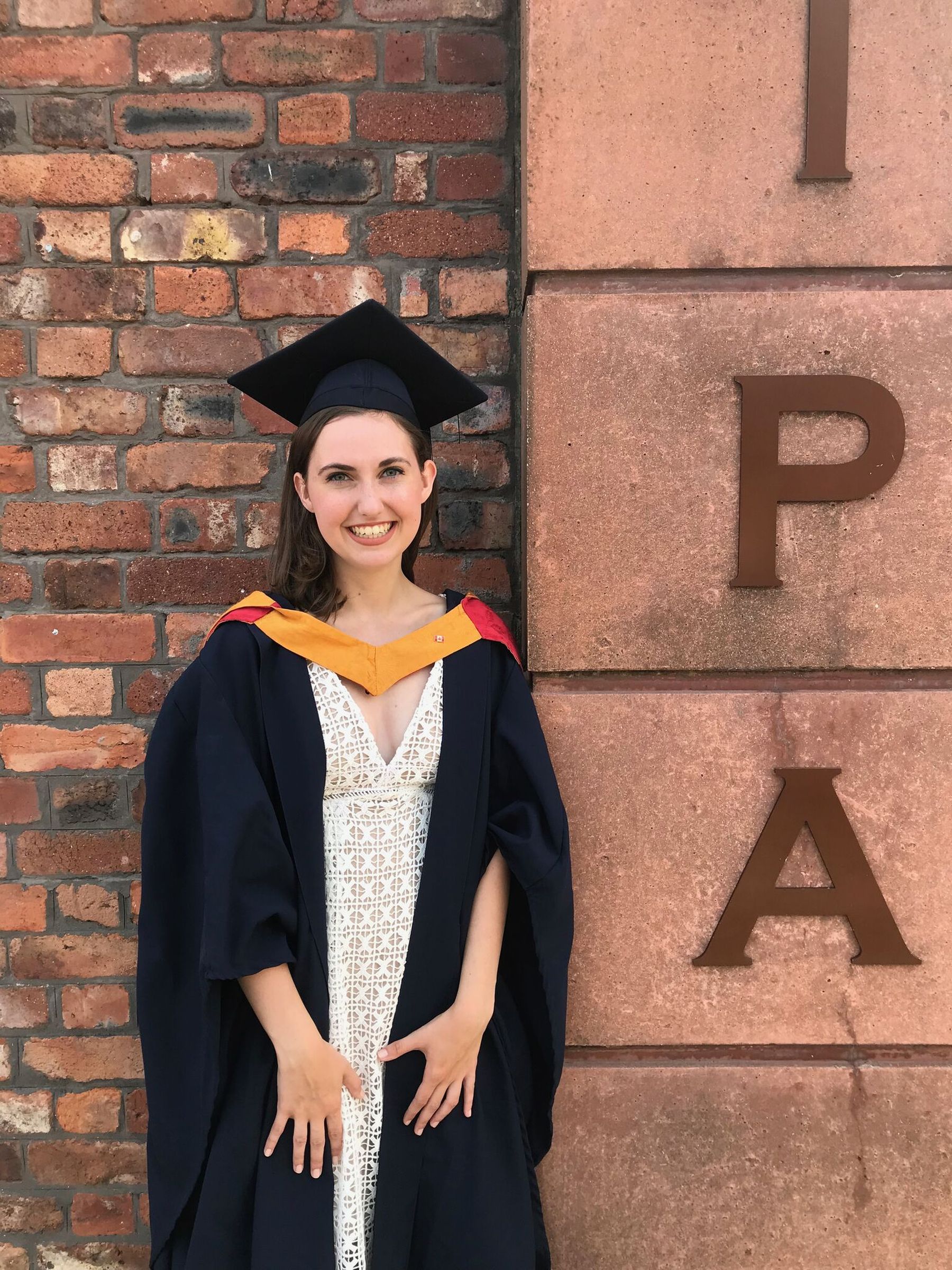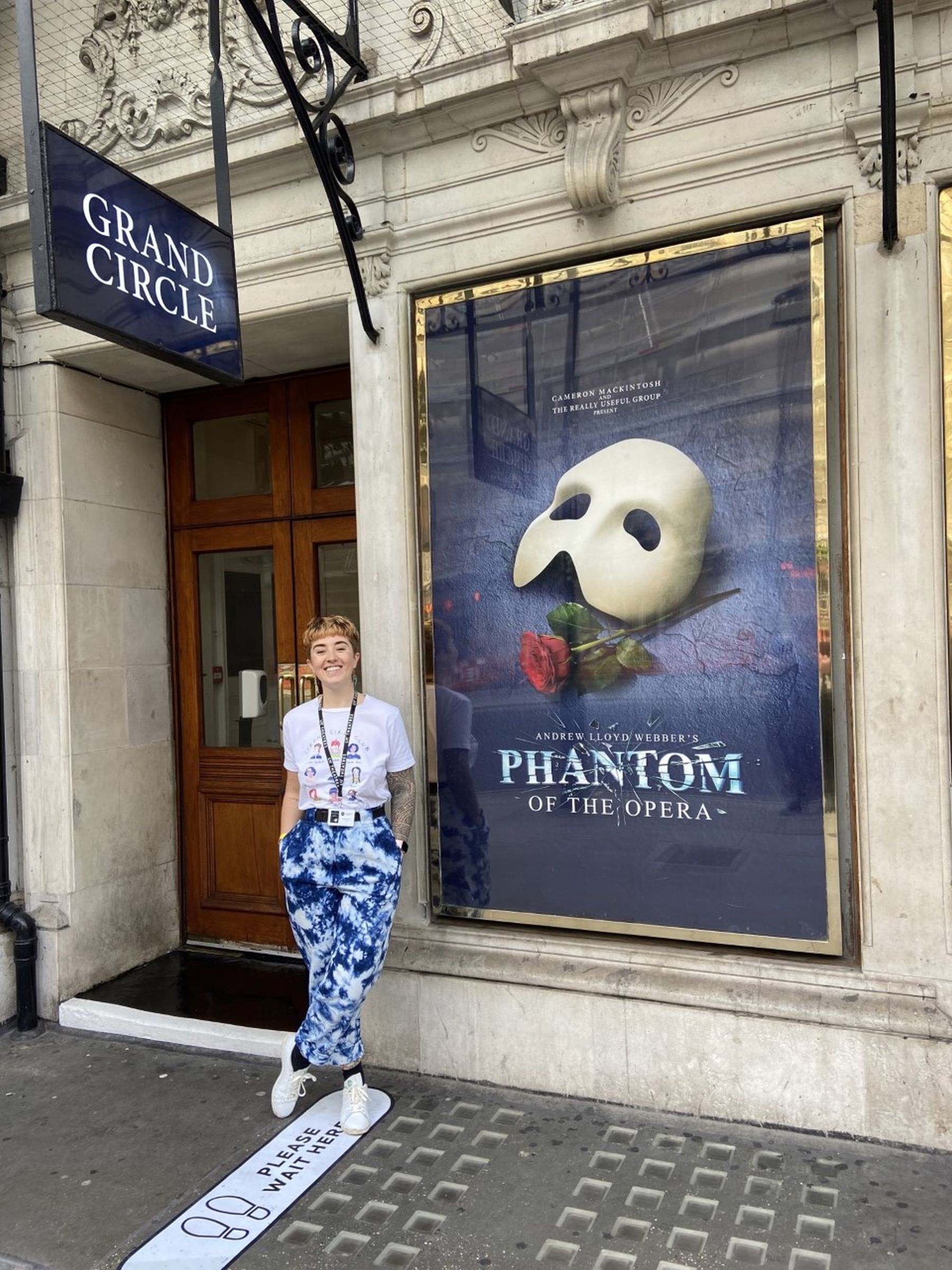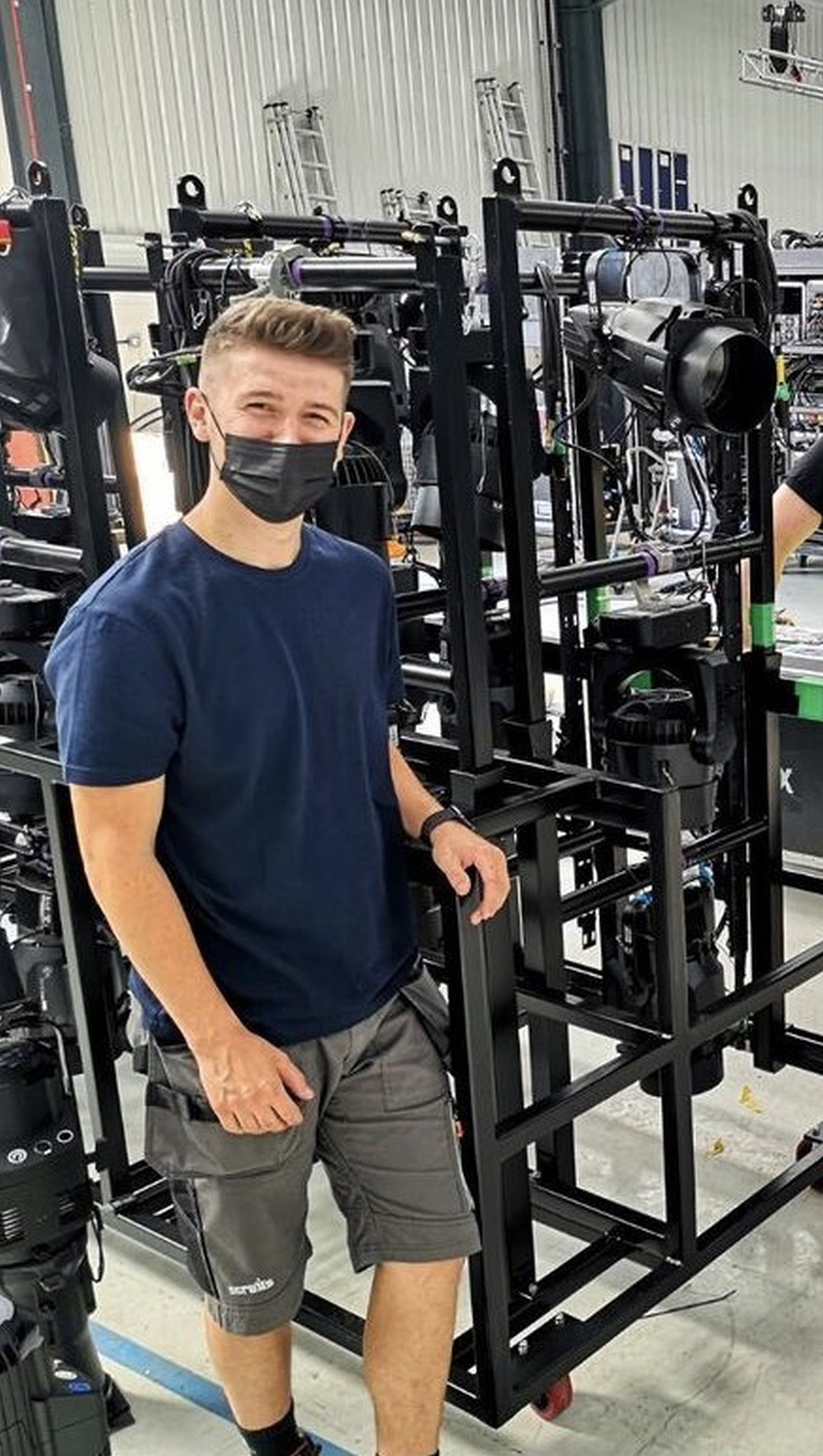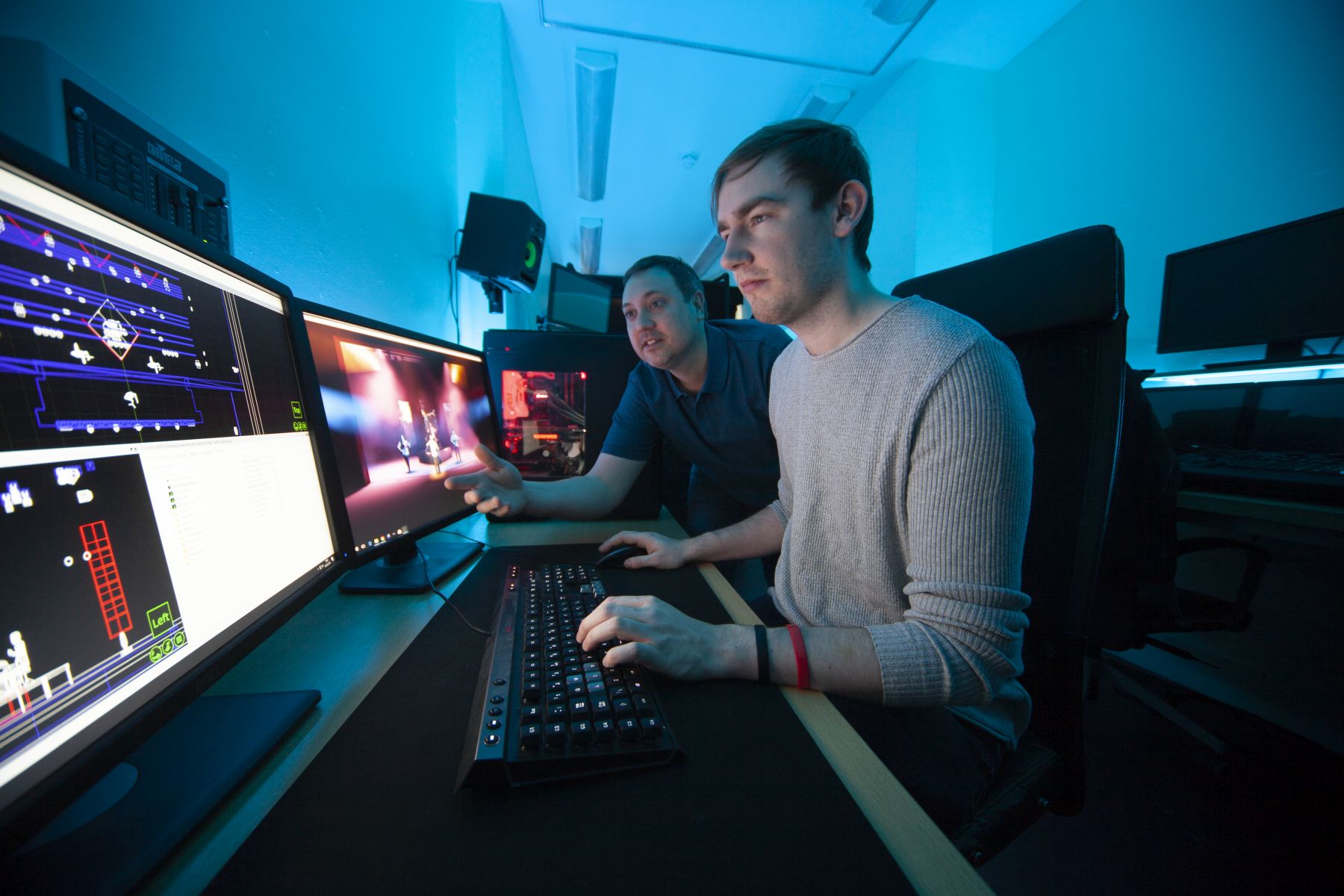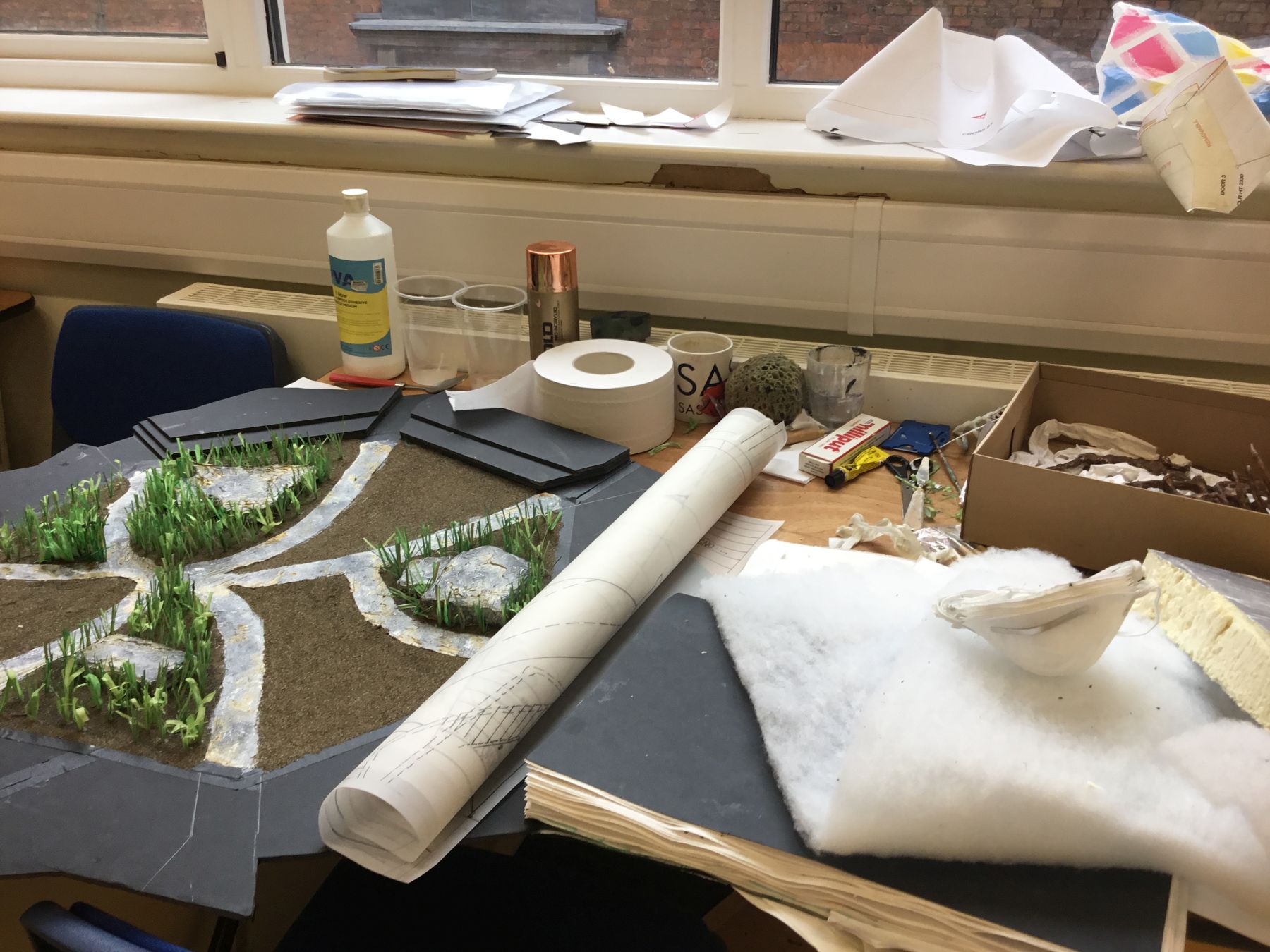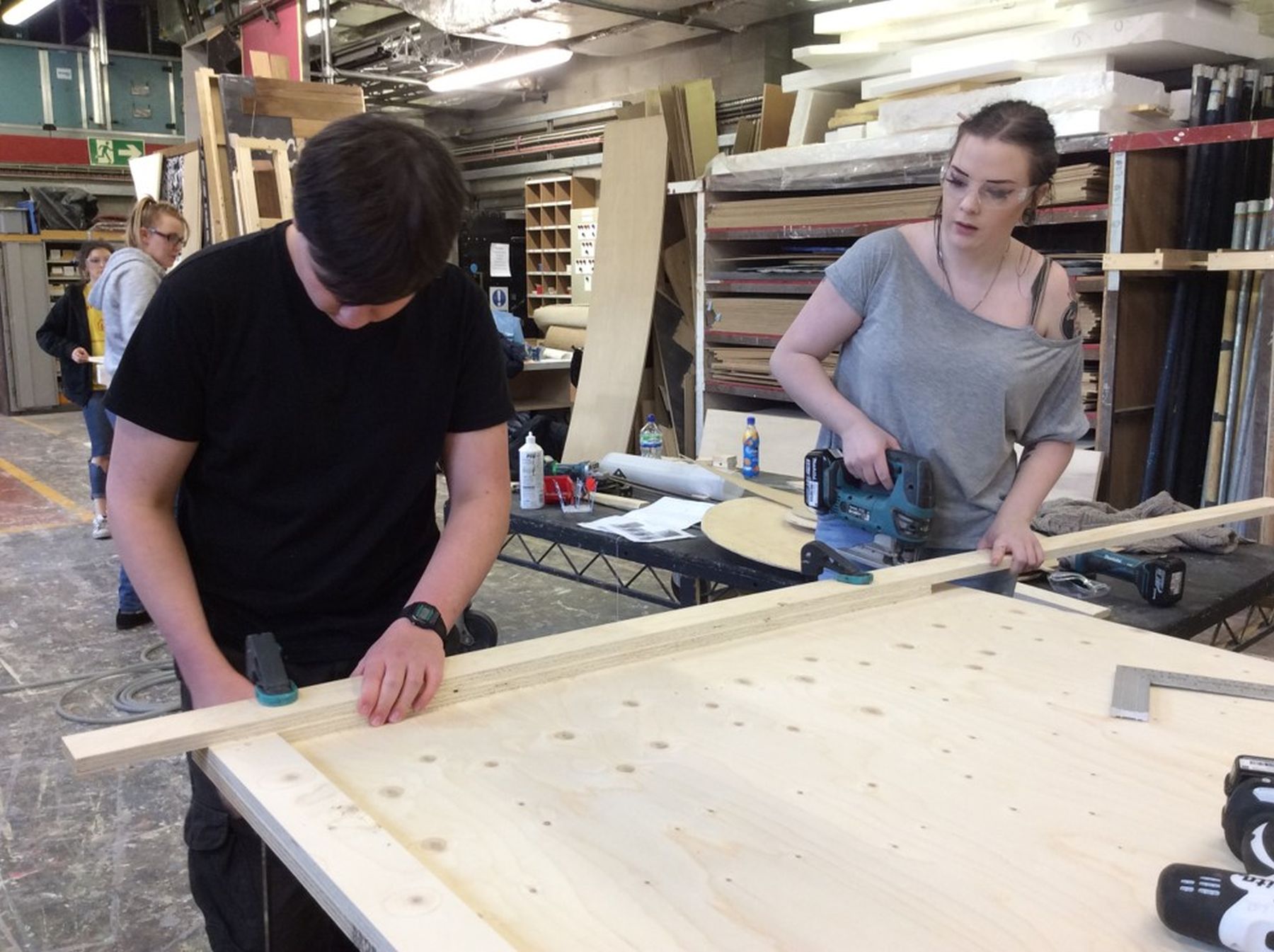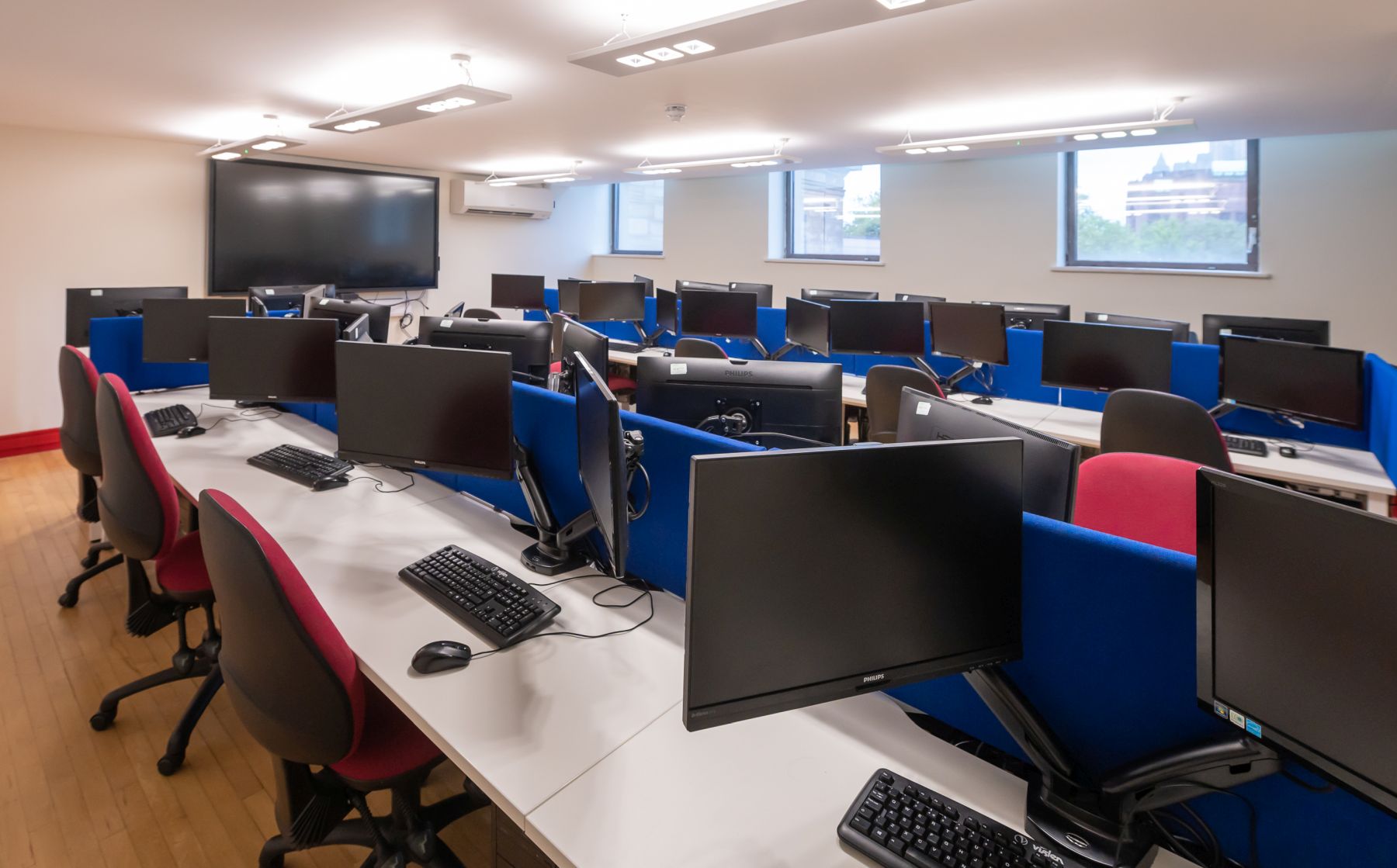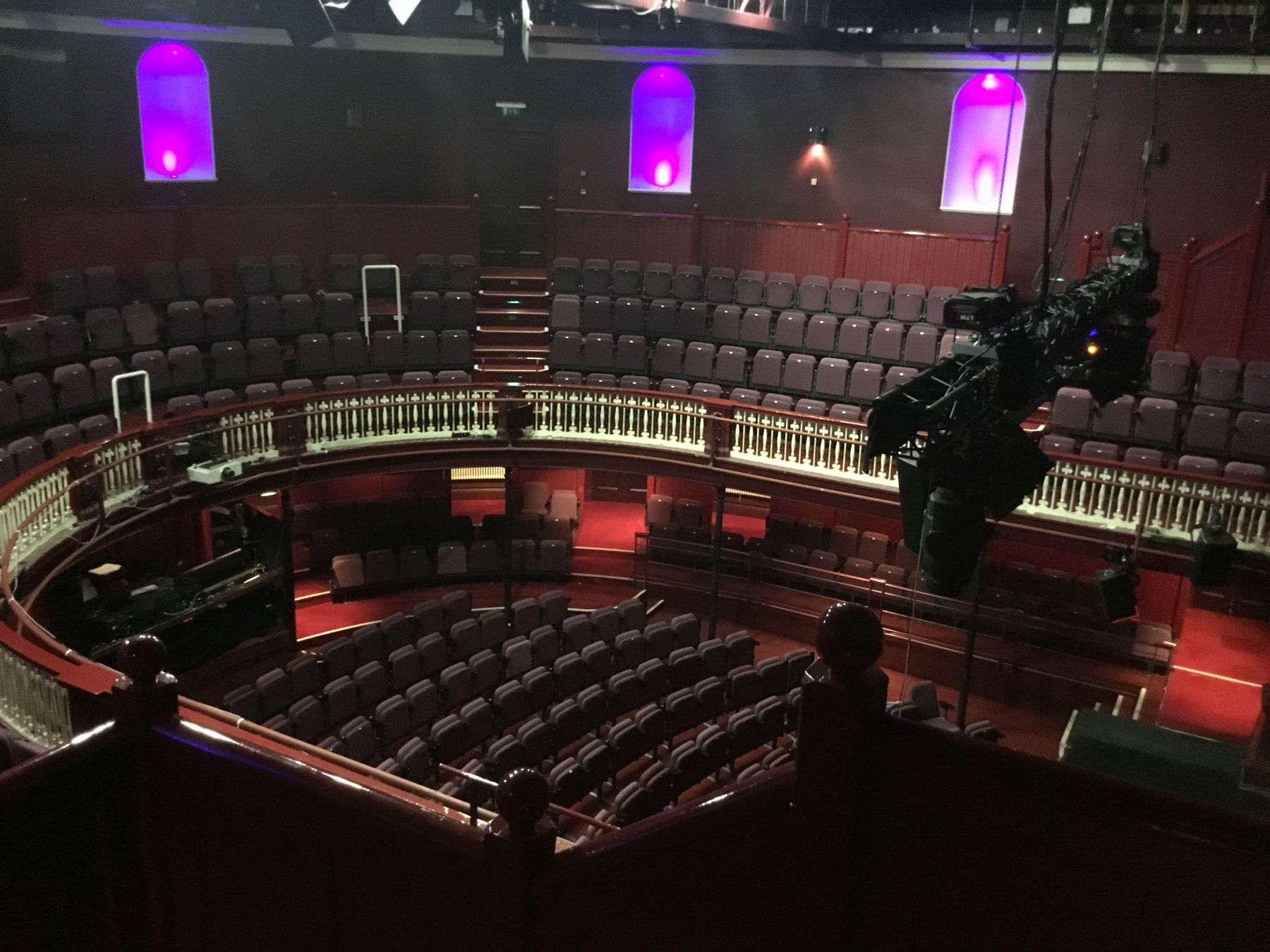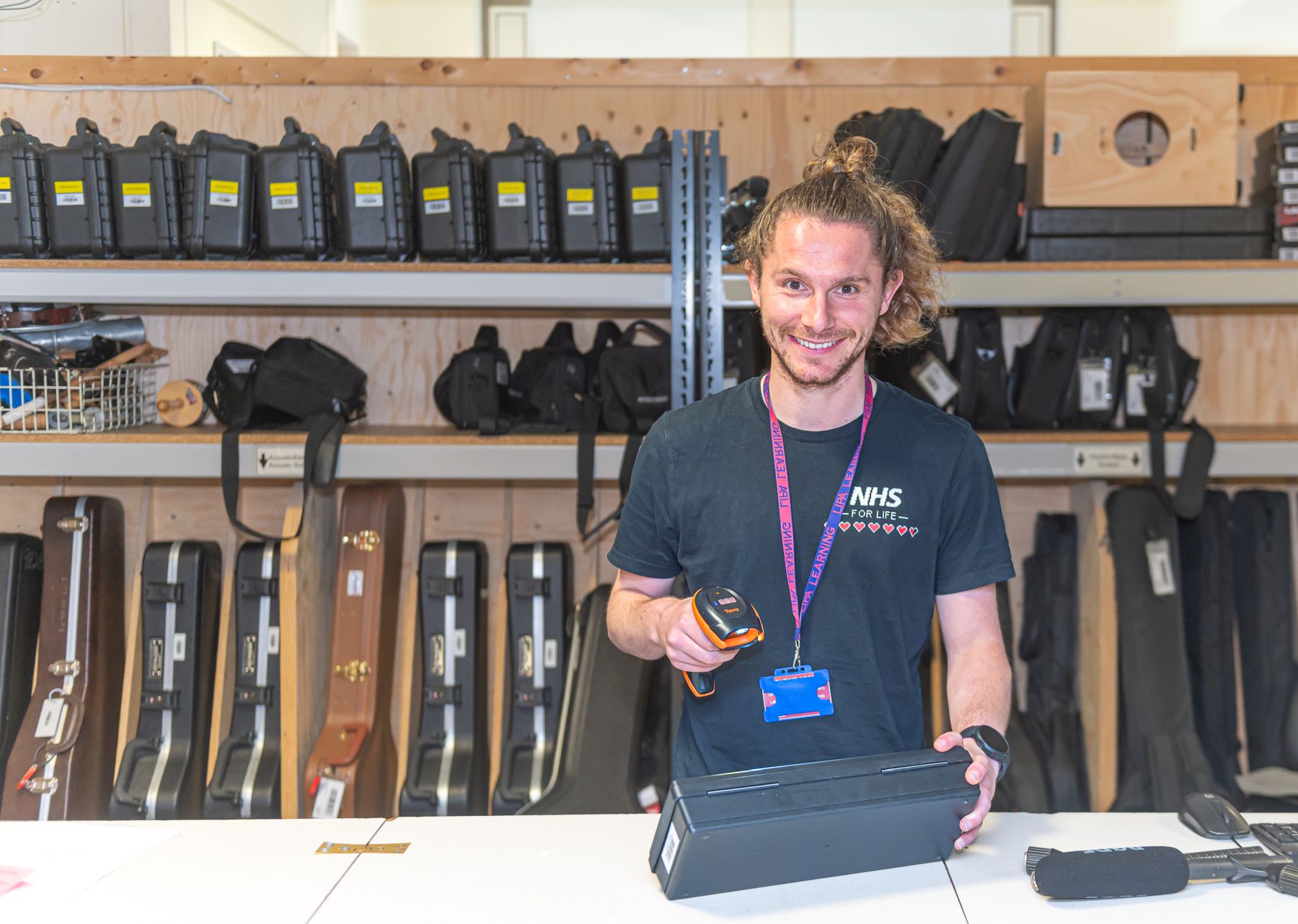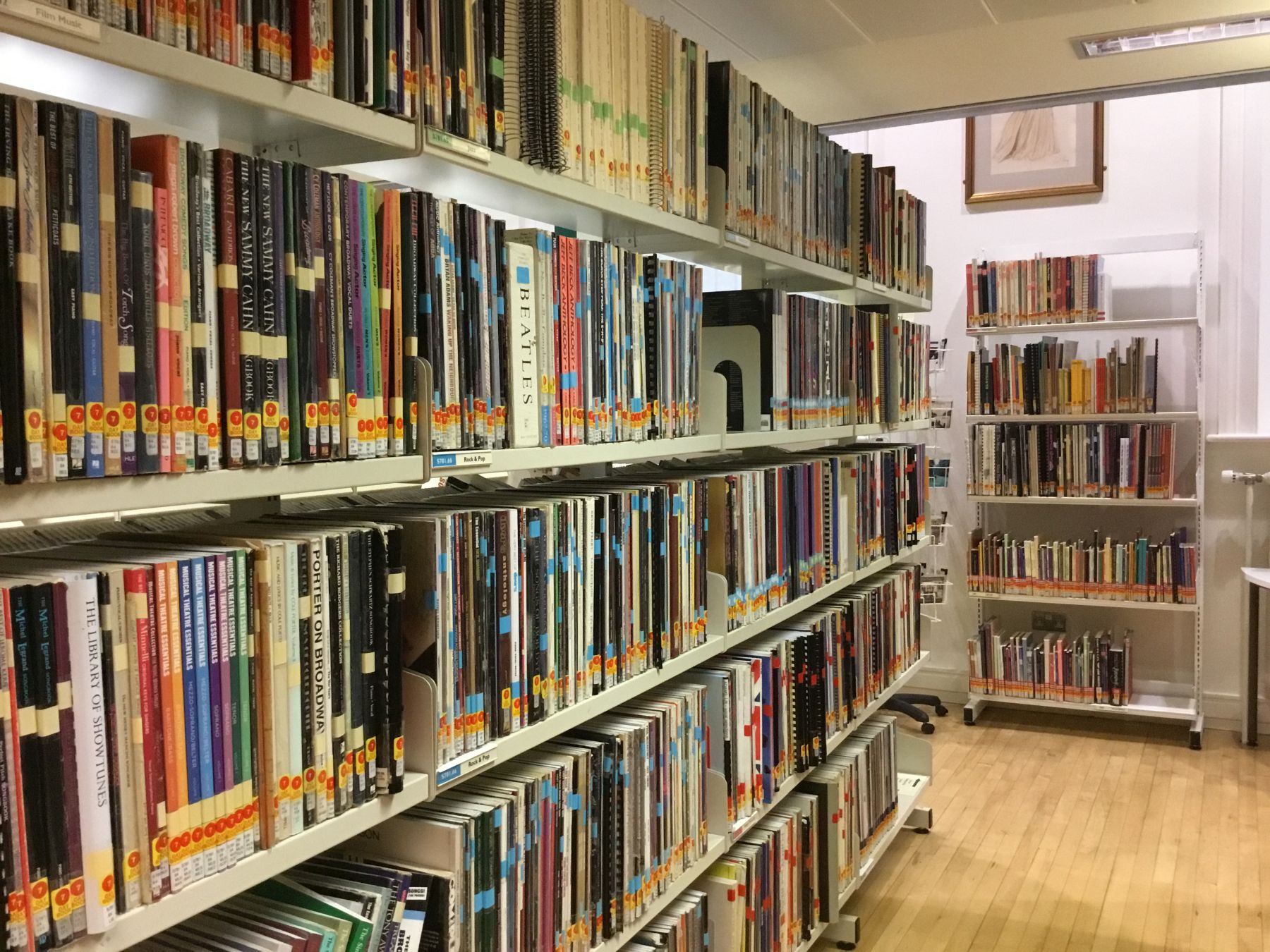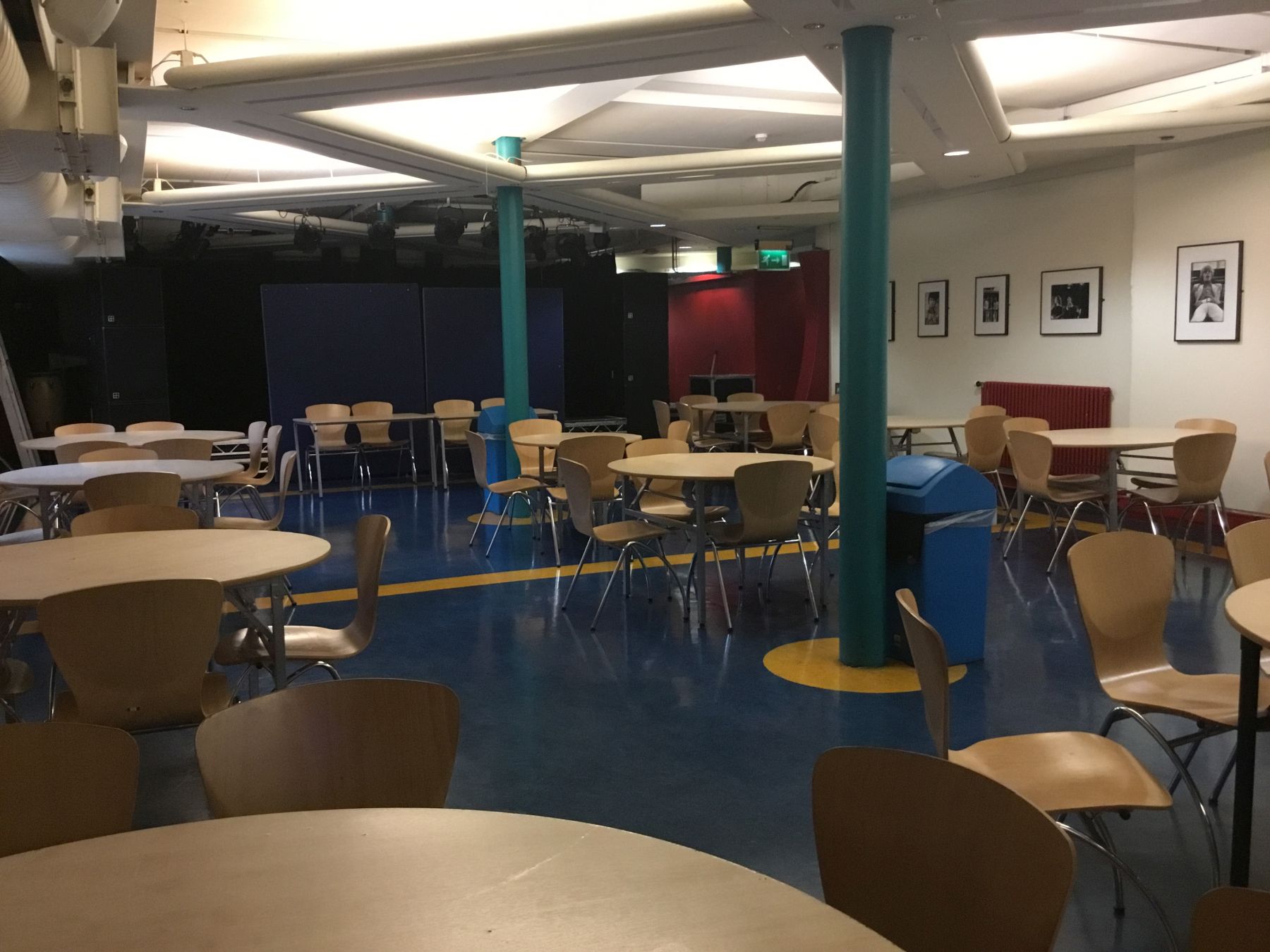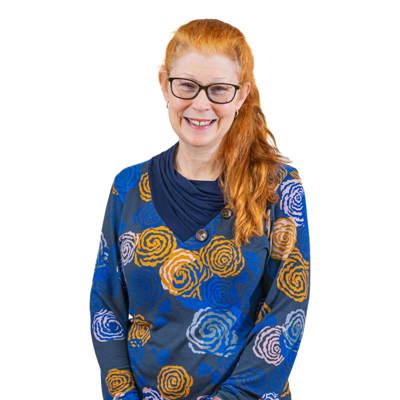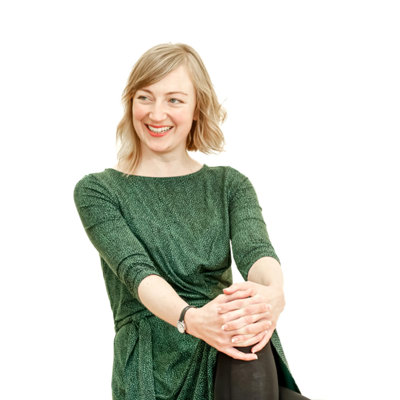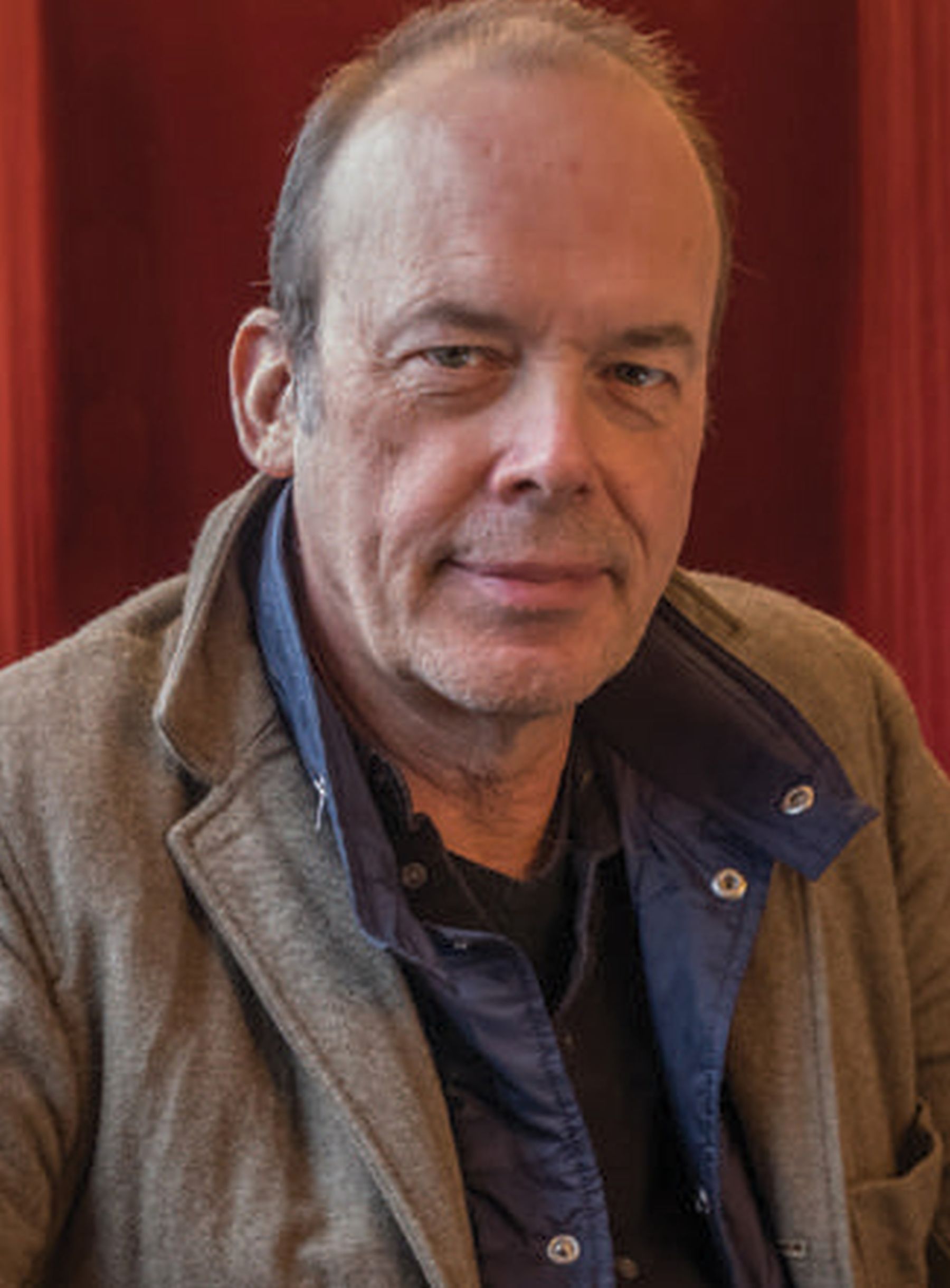Course
Overview
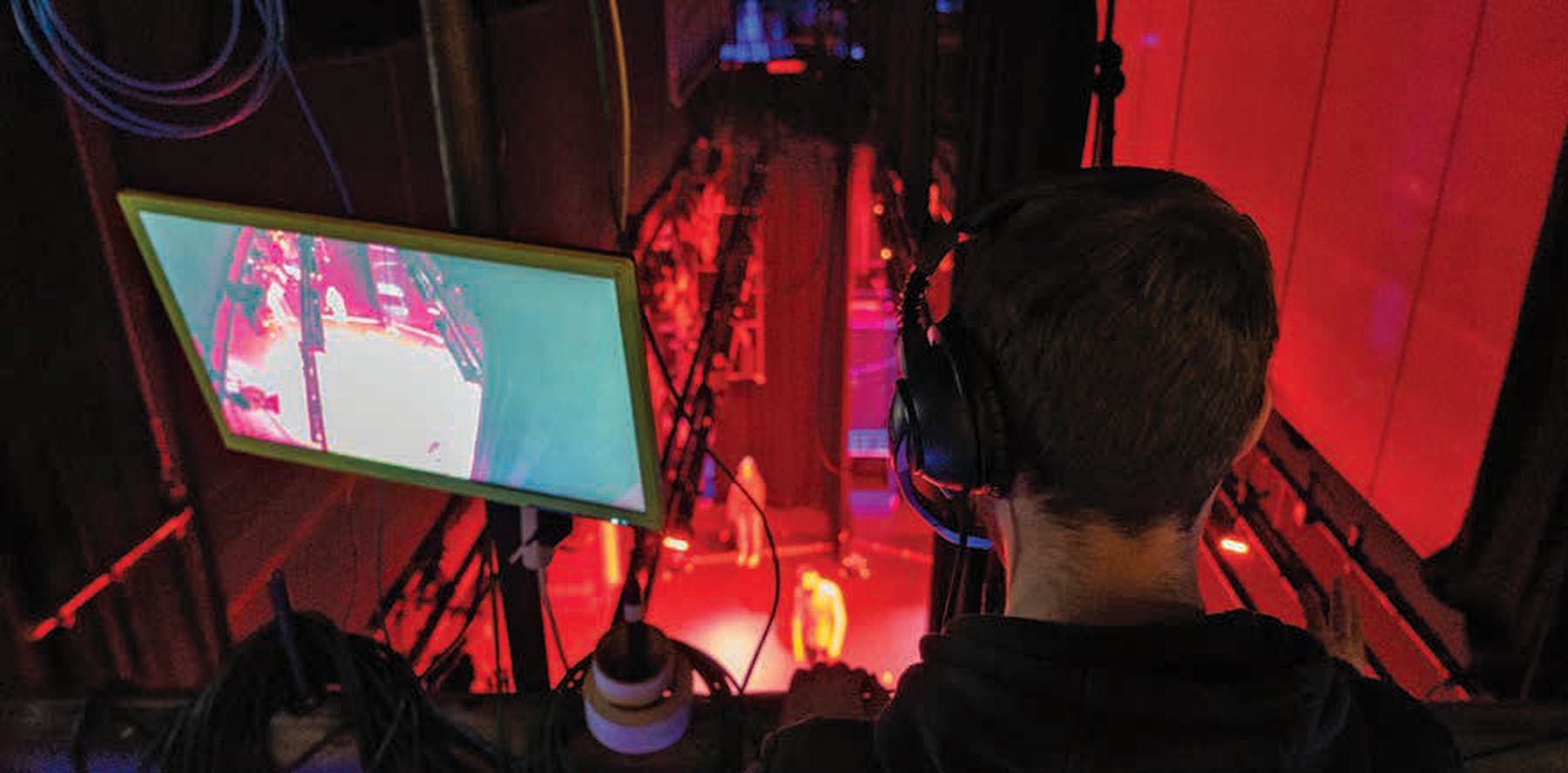
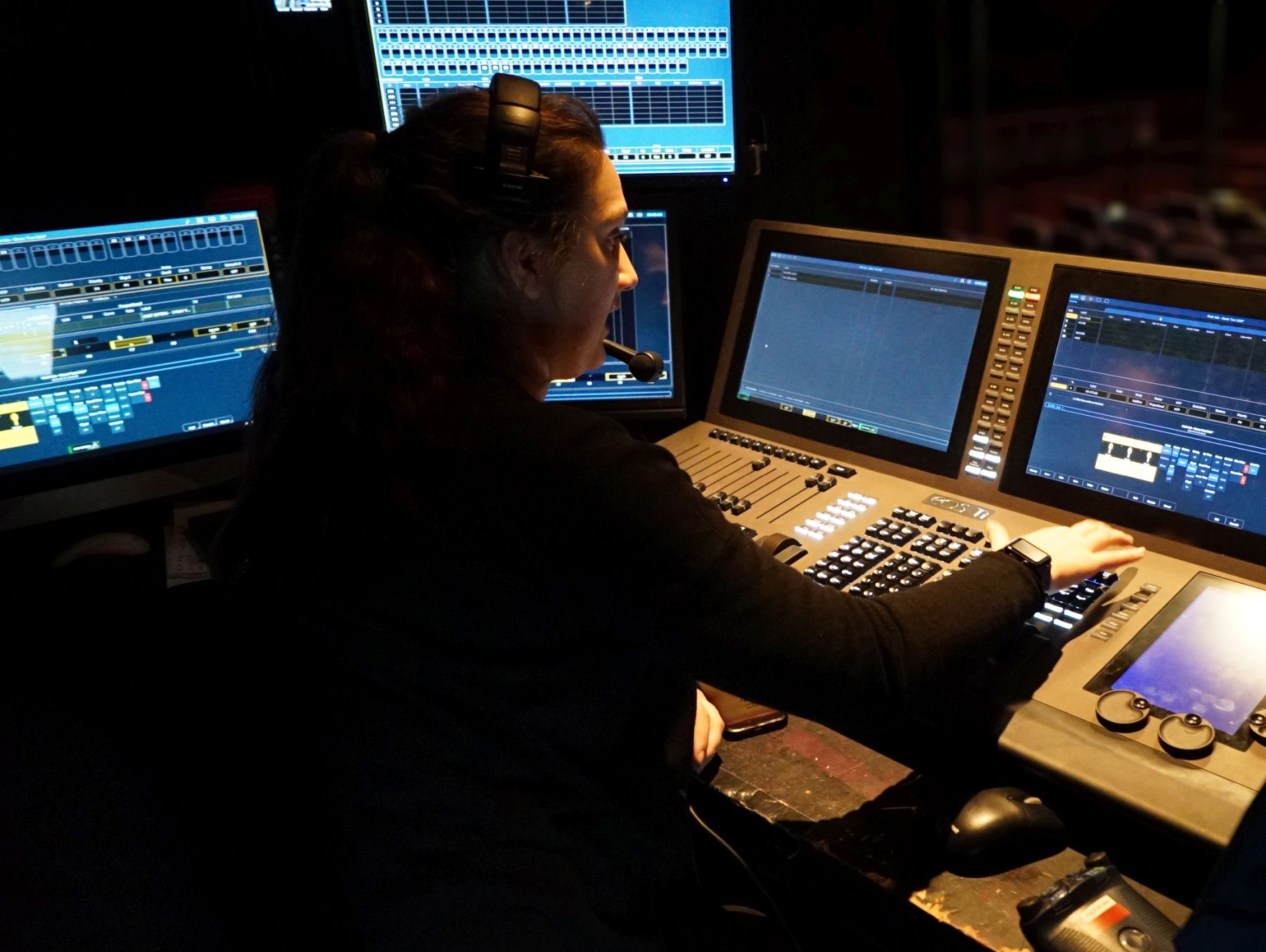
This course is ideal if you want to develop your creative design and technical skills to pursue a career in lighting, sound, stage management, production management, rigging, prop making and scenic construction.
Our approach allows you to gain a broad range of skills in all backstage disciplines, before specialising in your chosen field.
By working on our extensive programme of public performances, you will become a versatile practitioner with a comprehensive CV and portfolio of fully realised productions.
You will be able to thrive in theatre, film and TV, dance, gigs, festivals, digital, immersive and site-specific performances.
Accredited By:

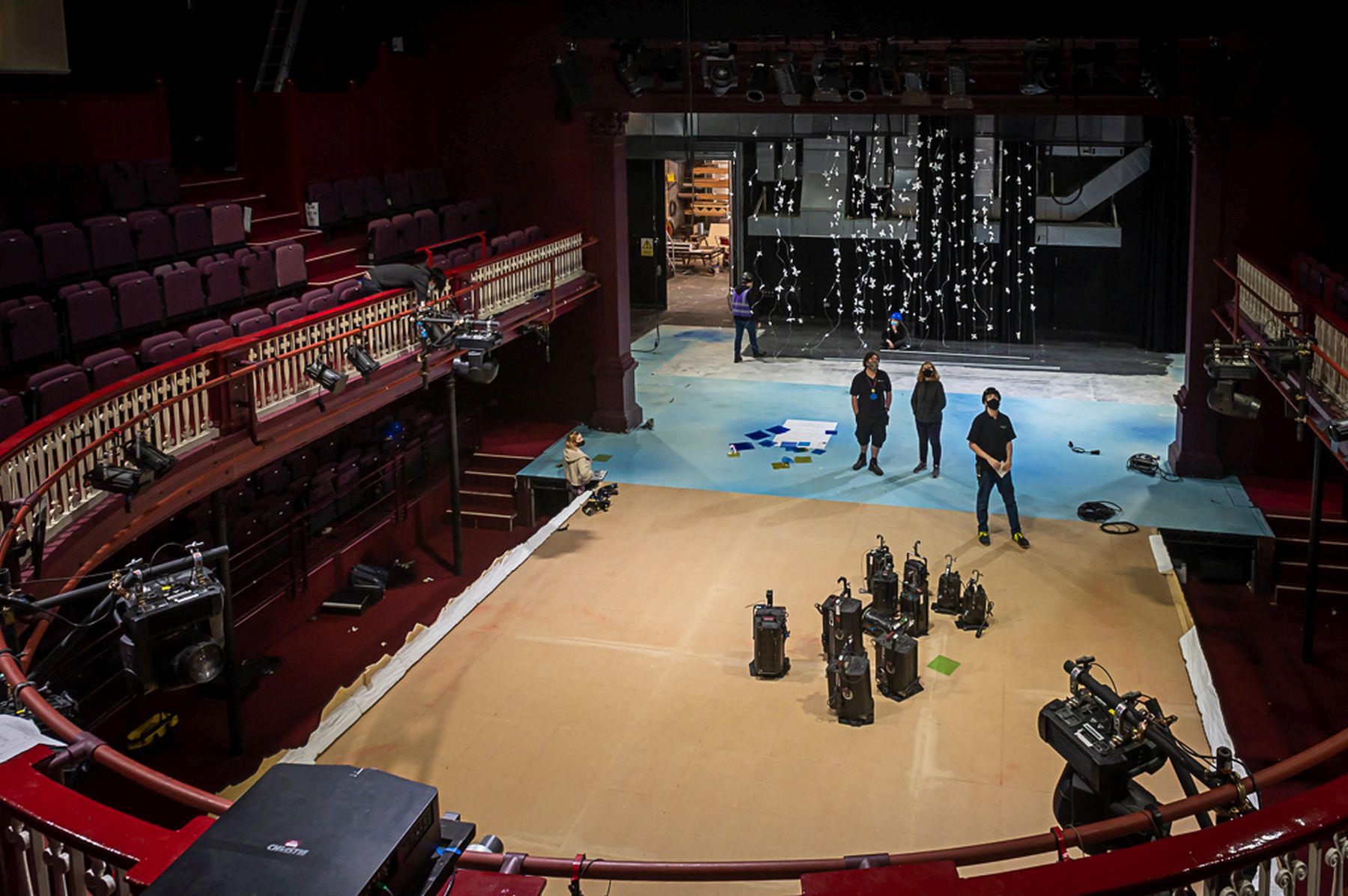
Course Highlights
- Get hands-on experience with practical learning in a production house environment.
- Choose the technical area you love the most and specialise in it.
- Produce work and collaborate with students from a wide range of creative and performing arts courses.
- Feel empowered to take creative risks supported by industry expert tutors.
What You Will
Study
Essential Production Skills
This module introduces you to the basic theories, practice, skills, and technologies used in the core backstage professions of stage management, lighting, sound, stage rigging, scenic construction and prop making. You experience a broad range of fundamental practical technical skills, underpinned by industry and discipline specific health and safety regulations and safe working practices.
This module/unit content is indicative.
Collaborative Practical Project
In this module you collaborate with first year Theatre and Performance Design students to create and realise an exhibition, installation or event. This enables you to develop and practice your planning, management, creative, fabrication and communications skills as well as using the skills learnt in the Essential Production Skills module.
This module/unit content is indicative.
Backstage Practice
In this module you choose two backstage production technician or assistant roles on LIPA’s season of public performances. It enables you to apply and advance the skills you have learnt so far, as well as develop essential collaborative and team working qualities.
This module/unit content is indicative.
Technical Drawing for Performance
In this module you are introduced to fundamental technical drawing, drafting and CAD skills as well as industry-recognised layouts of technical drawing for performance. You learn how these skills are used by all backstage production disciplines, from creating scenic construction drawings or stage and lighting plans and models with clear and accurate information, to creating animated environments for video production or creating 3D printed elements for costumes and props.
This module/unit content is indicative.
Research Project 1
This module is designed to ensure you can place your work and the work of others in both a broad socio-cultural context and within the context of the theories and practice of your own practical discipline. You develop your understanding by taking part in debates and seminars, extending your cultural reference points and developing vocational critical analytical skills.
This module/unit content is indicative.
Specialist Pathway – Lighting Design, Electrics, Programming (option)
In your second year you choose one of four specialist pathways. This module offers you in-depth study and practice in the design and technical aspects of lighting for performance. You develop your analytical and creative approach to lighting design as well as your skills and knowledge in technical lighting, electrics and lighting control programming. This gives you the understanding and experience needed to become an accomplished chief electrician/head of lighting or lighting designer.
This module/unit content is indicative.
Specialist Pathway – Sound for Performance (option)
In your second year you choose one of four specialist pathways. This module offers you in-depth study of two key aspects of live sound production – the technical and the creative. The technical covers advanced sound system design, deployment, and optimisation for live sound performance along with communication and wireless microphone and monitoring systems. The creative element explores the concepts and processes involved in theatrical sound design along with the complexities, subtleties, and challenges of the role of Theatre Sound Designer.
This module/unit content is indicative.
Specialist Pathway – Stage Management (option)
In your second year you choose one of four specialist pathways. This module offers you in-depth study of stage management and includes aspects of production management and event planning, in preparation for a career backstage in theatre and live events. You develop an understanding of the entire process of stage management by taking part in practical workshops, lecturers, and work on a live performance, either within LIPA or an external venue.
This module/unit content is indicative.
Specialist Pathway – Stage and Scenic Construction (option)
In your second year you choose one of four specialist pathways. This module offers you in-depth study and practice in technical stage management and scenic construction. You develop skills and understanding in stage operations, rigging and flying technologies, set building carpentry, welding and fabrication, prop-making and scenic sculpture, construction management and industry-related regulations. It equips you with the hands-on experience to become a skilled scenic carpenter, technical stage manager or head of stage.
This module/unit content is indicative.
Production Practice
In this module you are allocated at least two production roles related to your specialism on LIPA’s season of public performances or appropriate projects. At least one of them is at a senior assistant/deputy level bringing with it greater responsibility and challenges. You extend your practical knowledge of the role, employ a range of production skills and extend your collaborative abilities while managing responsibilities within a team.
This module/unit content is indicative.
Industry Placement
This module is a chance for you to gain industry experience in your chosen field of work. Guided by the module leader, you research suitable placements within the performance, design and production industries before selecting and securing your own placement. This module enables you to increase your understanding of industry practices, develop your CV and employability while expanding your professional network.
This module/unit content is indicative.
Research Project 2
This module further expands and deepens your awareness of cultural context by understanding how the performing arts are influenced by the social and political environment in which they operate. Through a series of lectures, masterclasses, field visits and research study you develop an appreciation of key theatre practitioners, directions, genres and national and local contemporary cultural, social and political issues in related areas of study.
This module/unit content is indicative.
Professional Practice
In this module you undertake at least two senior production roles on our professional-standard public season productions, appropriate external events or self-led individual projects which reflect your own career aspirations. This enables you to apply your specialist skills to realise a production or project in full, strengthening your self-management skills and working practices while experiencing a simulated industry environment.
This module/unit content is indicative.
Production Department
In this module you continue to work on professional level shows and productions at LIPA, but this time as a member of a backstage production department related to your specialism. You refine your practical and self-management skills within a structured work-based environment that has real responsibilities and duties, managing production processes, logistical and resource constraints and identifying and fulfilling roles and duties, working as part of a team.
This module/unit content is indicative.
Professional Career
In this module you consider your personal and professional skills and strengths as you prepare for your career. You cover business management and financial skills, such as tax self-assessment, public liability and indemnity insurances, unions, and organisations. You identify and complete a professional development activity to support your personal career portfolio.
This module/unit content is indicative.
Research Project 3
In this module you investigate an idea at the forefront of your practice. Through your work you build upon the theoretical knowledge and research skills developed throughout the course. You identify a topic to explore that is relevant to your career aspirations, conduct your own research and evaluate information, ideas and concepts from a wide range of sources to produce a final piece of work.
This module/unit content is indicative.
How You Will
Study
-
Workshops
-
Practical Productions
-
Lectures
-
Tutorials
-
Seminars
-
Independent study
-
Group Work
-
Masterclass
How You Will Be
Assessed
You are continually assessed on your practical work and contribution to projects. There is written work in the form of production paperwork and self-reflective evaluations, and a final research project at the end of your third year when you explore an area of your choice.
Practical/written work ratio
80% practical work / 20% written assignments

Sheryl-Lynne Valensky
Head of Theatre and Performance Design and Production Technology
Sheryl-Lynne has over 20 years of experience in stage management. Specialising in Musical Theatre and Circus she worked for Cirque Du Soleil for 10 years as artistic director, assistant artistic director and general stage manager, touring internationally with five shows. Sheryl-Lynne's other stage management credits include Disney Presents The Lion King and Phantom of The Opera, both in Toronto as well as numerous music and award ceremonies both live and broadcast. An experienced educator, she has previously worked at Guildford School of Acting and East 15 Acting School.
Sheryl-Lynne teaches the roles of stage manager, deputy stage manager and assistant stage manager. As Head of Department, she works closely with production teams to help ensure the quality of shows and performances is maintained and that it is the students who are driving the production process.
Sheryl-Lynne's extensive and varied experience enables her to bring a unique perspective to her teaching, highlighting to students how they too can create their own individual career path that matches their passions and strengths. Her international work means she is well equipped to give insights into practice outside the UK and highlight global opportunities.

Paul Halgarth
Programme Leader: Theatre & Performance Technology
Paul has worked as a freelance lighting designer, re-lighter, lighting control programmer and production electrician. He has worked for the Crucible Theatre, Sheffield and West Yorkshire Playhouse, Leeds on drama, musical and dance productions, as well as co-productions with Birmingham Rep, Liverpool Everyman, Phoenix Dance Theatre and Slung Low, among many others. He exhibited a lighting design for Flight Paths at the exhibition, Make: Believe in 2015. Paul’s experience with some of the industry’s leading lighting designers and creative teams on different scale events means he can impart industry-standard practices and equip students with the skills needed to work in the field.
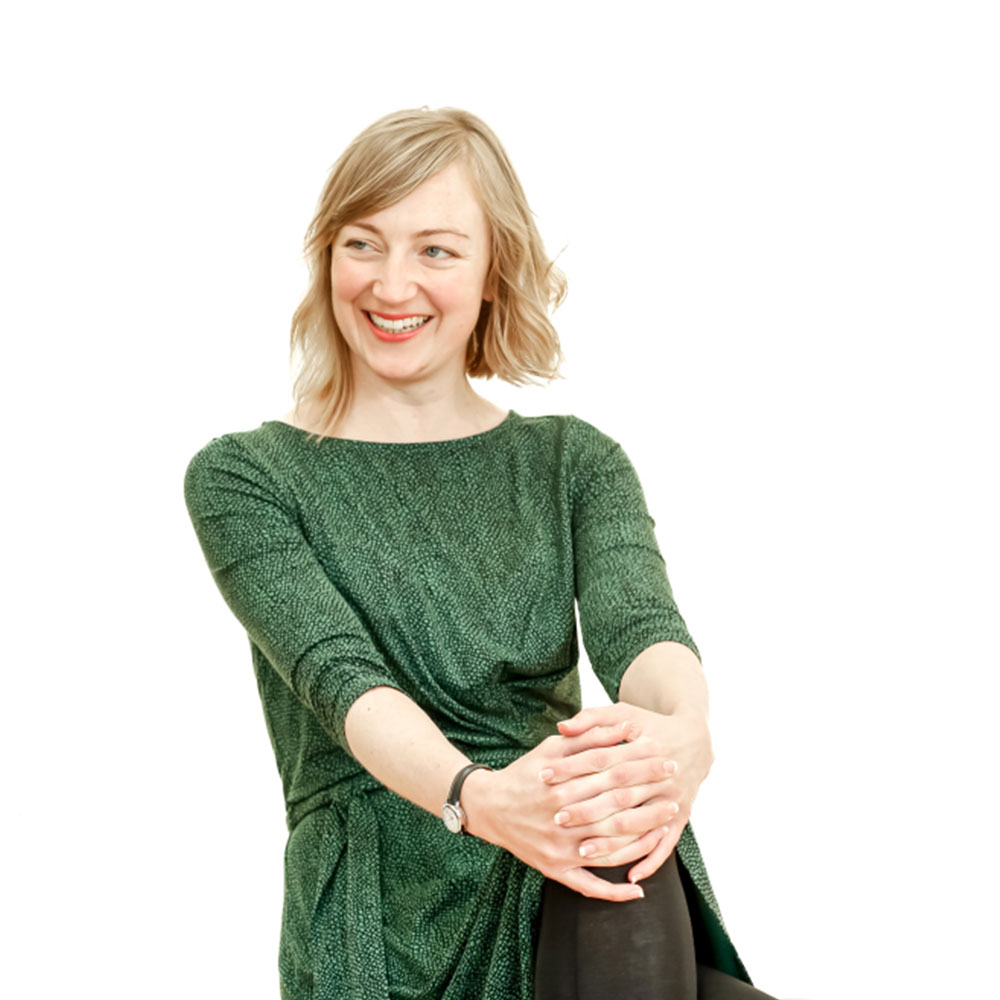
Lois Maskell
Programme Leader: Theatre & Performance Design
Lois has been shortlisted for the Linbury Prize for Stage Design and was a finalist in the BBC Design Vision competition. Recent collaborations as a set and costume designer include Action Transport Theatre, 20 Stories High, Royal Exchange in Manchester and the BBC comedy series The Mighty Boosh. In 2012, her site-specific designs for renowned company dreamthinkspeak were selected to represent UK design for performance in an exhibition at the V&A Museum in London. She believes that giving students the freedom to learn is essential for them to develop new skills. Her continued professional practice ensures her teaching is current and reflects industry standards.

Jamie Fitzgerald
Lecturer
Over the last 20 years Jamie has worked across almost every facet of theatre, productions, and live events. As a scenic construction and construction project management specialist, Jamie is passionate about delivering training that bridges the gap between time honoured processes and the very latest technological developments.
Jamie’s recent professional work includes, workshop managing projects for end clients such as Gucci, Rolls Royce, Puma, and Bentley. Special collection launches by Yayoi Kusama and Pharrell for Louis Vuitton. Red-carpet events for Apple TV and BBC as well as immersive experiences for Secret Cinema.
Academically Jamie holds both a BA in Contemporary Art and a PGCE in Design and Technology. Between 2016–2022 he ran the scenic construction workshops for Guildford School of Acting. Since 2020 he has been the external examiner for Royal Welsh College of Music and Drama’s foundation degrees in both Scenic Construction and Scenic Art.
For Jamie, working in theatre and live events provides the perfect vehicle for making cool stuff in a creative and collaborative environment. He aims to share this passion for his chosen industry with his students while helping them explore the many transferable skills that his specialism has to offer.
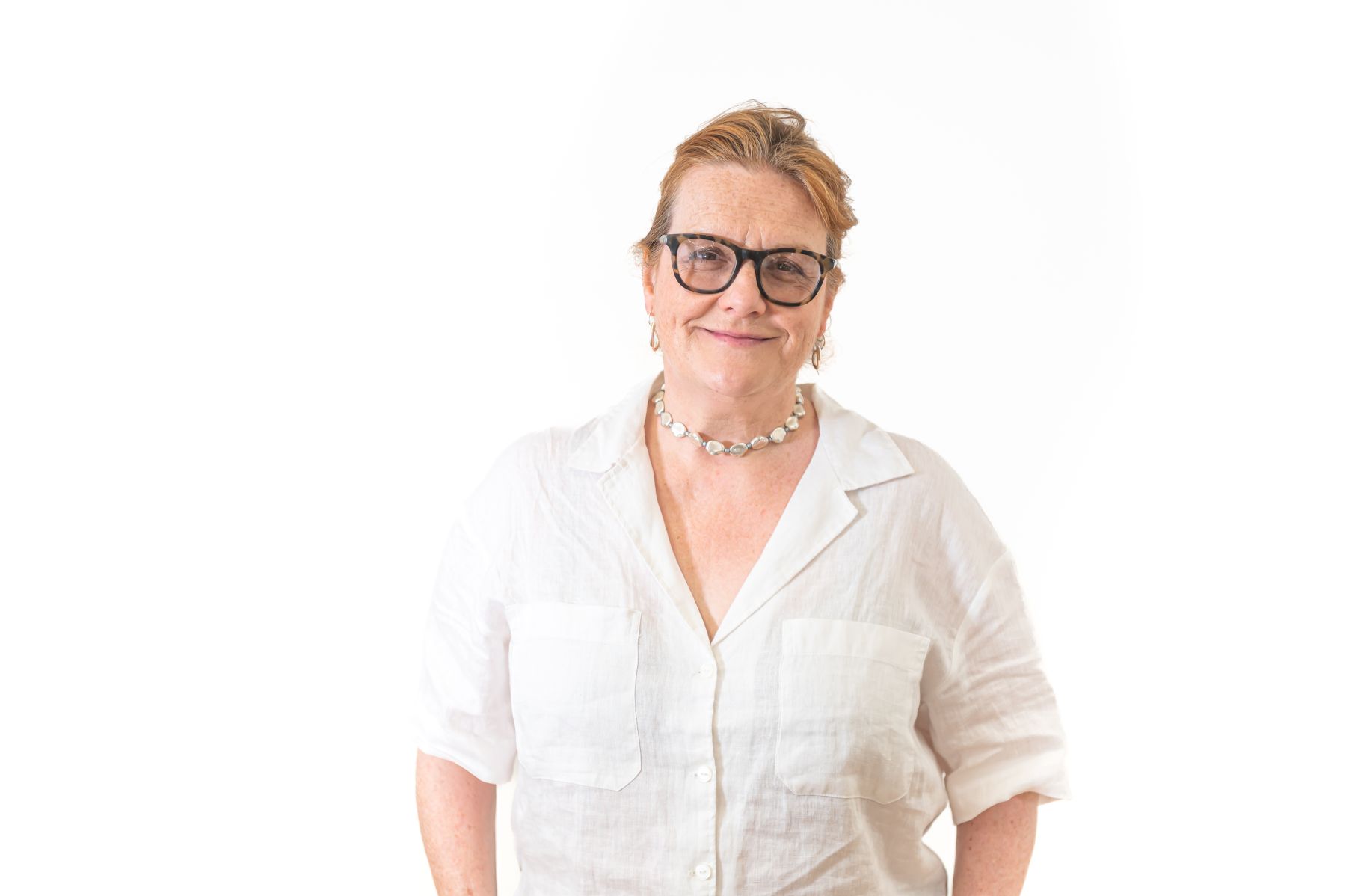
Emma Wright
Lecturer
Emma worked as a design assistant, scene painter, prop maker and production co-ordinator at a special effects creature workshop at Shepperton Studios, before becoming a production manager at the Liverpool Everyman & Playhouse. She enjoys running explorative making workshops and using her breadth of experience to mentor students on their production work, encouraging them to apply and develop their skills on varied projects. Emma feels that learning on the job is a great way to nurture practical skills, as well as a committed work ethic and collaborative skills – and hopefully have fun at the same time.
What Our
Graduates Do
Our graduates work in theatre, musicals, live music, large-scale events and television in a variety of roles, including lighting technicians and programmers, lighting designers, sound designers and operators, stage managers, production managers, producers, riggers, scenic carpenters and props makers. Their career achievements have included:
Tracey Gibbs (2019)
Lighting and video designer. Lead Artist for Arts Council England funded R&D project HOYO
Kate Condon (2018)
Production coordinator for visual effects and animation studio at DNEG
Alice Barry (2017)
Project and event coordinator at Brandfuel Ltd, brand experience agency with clients such as Google.
Joshua Clague (2016)
Assistant production manager at Eventim Apollo. He also co-founded two companies and was co-director of documentary film Road of Giants, released on Amazon Prime.
Rebecca Gee (2016)
Assistant stage manager on shows including Little Shop of Horrors at the Regent’s Park Open Air Theatre and The Ferryman, 9 to 5 the Musical and Harry Potter and the Cursed Child, all West End.
Johanna Coraline Jensen (2015)
Stage manager at Hålogaland Theatre in Tromsø, Norway.
Javier Pando (2015)
Sound operator for shows including Matthew Bourne’s Swan Lake tour and Girl from the North Country, West End. He was formerly sound no. 2 for National Theatre.
Dave Baxter (2014)
Freelance lighting technician. He recently worked on Britney Spears’ Piece of Me tour around the USA and Europe. Other work includes Drake’s world tour and comedian Bill Bailey.
Jonathan Sims (2012)
Director, Events Design Company Limited. Its credits include UEFA Champions Legue Final 2021, UEFA Euros 2020, Liverpool Giants 2018.
Marec Joyce (2007)
Technical operations manager for the Pleasance Theatre Trust in Edinburgh. Responsible for the organisation’s technical operations at the Edinburgh Festival Fringe.
Related
News

Gallery: In Dreams exhibition

LIPA grad to direct a Play for Today for Channel Five

Winter/Spring season of public performances

Gallery: Term one productions 2025/26

A busy and creative Christmas for LIPA grads

LIPA secures £2.5m Office for Students capital funding to deliver new performance and digital innovation hub

Gallery: Living Portraits - The Medieval-ists

LIPA and Sefton Council join forces to bring fresh creative energy to Salt and Tar

Autumn/Winter Season of public performances

Production student creates installation for Strawberry Field

LIPA achieves major milestone: new degree awarding powers

Gallery: Graduation 2025

Sir Paul McCartney honours leading arts figures at LIPA graduation

LIPA grads and students head to Edinburgh Fringe

Gallery: The Bees

LIPA’s festival of new music to showcase 60 artists

Life after LIPA: Documentary filmmaker, Alexandra Lacey

Watch: Time-lapse of Harvest stage and set build

Watch: The making of Journey to the Moon

Gallery: Journey to the Moon exhibition

Watch: Solotech launches 2024/5 partnership with technology students

LIPA grads get creative for Christmas

Gallery: LIPA Christmas Concert

Gallery: Living Portraits - The Fantastical Medieval

Gallery: Celebrating over 25 years of Performance Design at LIPA

LIPA shortlisted for environmental award

LIPA grads and students at Edinburgh Fringe

Gallery: Graduation 2024

Award-winning LIPA grad honoured by Sir Paul McCartney

WATCH: 2ube Xtra - LIPA’s student run music festival

LIPA students and graduates collaborate on new dance show
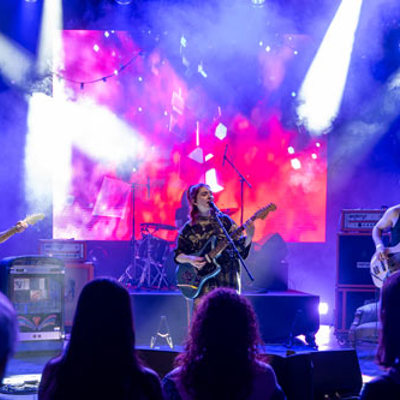
Twelve day music festival showcases LIPA students
Educational qualifications are important but limited in what they can tell us about you.
Your natural ability, your fit with what and how we teach, your growth and your potential are also key factors in our admission process. We can’t evaluate these solely on your educational achievements, so no matter which course you are applying for, we look for the following attributes on your application and at the interview stage.
Additional Costs
As part of this course, there are likely to be some additional costs that are not included within your tuition fees. Many of these are optional. We’ve also included information about cost of living expenses in Liverpool in this section.
Equipment
There are a number of things you will be required to have at the beginning of your study. We understand that most students have to work to a very tight budget so we have limited the required tools to those that are absolutely essential for you to be able to start work here. We will send you a list of essential and desirable equipment before you enrol, but items all students will need include an LED head torch, comfortable safety (steel toe cap) footwear, an 8m tape measure, a good quality (Bahco) 8-inch adjustable spanner, a 1:25 scale ruler, craft knives and craft scissors, an A4 sketch book and lever arch folder, and a good set of technical drawing pens and pencils. This initial outlay could cost around £75-£85 on average.
Most of the equipment and workshop materials you will use throughout your study will be supplied for you by the programme. Any additional equipment you may need, or would like to purchase, as you progress through your studies will be based on your specialist pathway choice in your second and third year of study. We will notify you of these items ahead of time, but we expect this cost to be no more than £100. During your studies there may be small printing and binding costs associated with your assessment too.
Our programme is highly practical and involves rigging, construction and painting activities. It is advisable to keep a set of old clothes/overalls/shoes for messy work.
All computer software that you will be asked to use is provided in LIPA and is available in our computer suites. However, students seeking to invest in personal laptops or tablets for coursework may wish to wait until after enrolment to speak with current students and staff in identifying which device may be best for their studies and most appropriate to their budget.
Trips and training courses
As part of the various modules on the programme, some class trips may be offered to help support your learning. Some of these will form part of the curriculum but most will be important additions to your work. Some trips may be free or subsidised, but you may be required to cover some costs yourself. There is typically an external trip in first year and second year of study, which costs somewhere around £25 -£30 each.
Throughout your studies there will also be opportunities to attend additional short training courses that will help you enhance your skills and employability. These are not compulsory, but you will have to contribute towards the cost of the training courses you choose to attend. The opportunities offered vary each year, but past training has included First Aid training and Cueing to Music sessions. There is also an opportunity in the third year of the programme for any additional training to count towards a module assessment, though this is not compulsory.
Seeing shows
You should see live performances as often as you can. This is not compulsory, but it will help your professional development. Theatre visits are not covered by your tuition fees, so you’ll need to cover these costs yourself. Most theatres offer student discounts for tickets (becoming a member of YEP means you have access to cheap tickets at the Liverpool Playhouse and Everyman Theatre) and we are occasionally offered a limited number of free or discounted tickets for shows in the city. We also encourage you to see all LIPA shows. We offer discounted student tickets to make this as affordable as possible. From time to time, we may also organise trips to regional theatres for backstage technical tours or to see a performance. In these cases, any travel and ticket costs will be additional.
Cost of living
Wherever you choose to study, you'll have to budget for accommodation and other everyday living expenses, such as food and bills.
Accommodation costs are relatively low in Liverpool, particularly compared to the south east of England, and the city's shops and entertainment venues also have lots of student discounts.
We’d recommend completing a simple budget plan to predict your income and outgoings. This should include accommodation, bills, insurance, TV licence, food, laundry, clothes, books, travel and socialising. How much you'll want to spend on a lot of these is completely personal.
There is lots of advice available online about budgeting:
- UCAS budget calculator is a great tool to help you balance your in-comings and out-goings.
- SaveTheStudent provides useful information on student money resources, including loans, budgeting, and scholarship sources.
Most UK students will be able to take out a maintenance loan to assist with living costs and there are some grants available. We also offer some bursaries. To find out more, please see Student Finance and bursaries.
Because our courses are intensive and we have a busy season of student performances, options for part-time work during our teaching periods can be limited. However, many of our students gain flexible part-time work, in performance venues, shops, restaurants and bars. We also provide casual work opportunities for our students ranging from stewarding work on our productions to working with young people to help us widen access to our courses. The long summer break is when many of our students choose to work.
Additional Costs
As part of this course, there are likely to be some additional costs that are not included within your tuition fees. Many of these are optional. We’ve also included information about cost of living expenses in Liverpool in this section.
Equipment
There are a number of things you will be required to have at the beginning of your study. We understand that most students have to work to a very tight budget so we have limited the required tools to those that are absolutely essential for you to be able to start work here. We will send you a list of essential and desirable equipment before you enrol, but items all students will need include an LED head torch, comfortable safety (steel toe cap) footwear, an 8m tape measure, a good quality (Bahco) 8-inch adjustable spanner, a 1:25 scale ruler, craft knives and craft scissors, an A4 sketch book and lever arch folder, and a good set of technical drawing pens and pencils. This initial outlay could cost around £75-£85 on average.
Most of the equipment and workshop materials you will use throughout your study will be supplied for you by the programme. Any additional equipment you may need, or would like to purchase, as you progress through your studies will be based on your specialist pathway choice in your second and third year of study. We will notify you of these items ahead of time, but we expect this cost to be no more than £100. During your studies there may be small printing and binding costs associated with your assessment too.
Our programme is highly practical and involves rigging, construction and painting activities. It is advisable to keep a set of old clothes/overalls/shoes for messy work.
All computer software that you will be asked to use is provided in LIPA and is available in our computer suites. However, students seeking to invest in personal laptops or tablets for coursework may wish to wait until after enrolment to speak with current students and staff in identifying which device may be best for their studies and most appropriate to their budget.
Trips and training courses
As part of the various modules on the programme, some class trips may be offered to help support your learning. Some of these will form part of the curriculum but most will be important additions to your work. Some trips may be free or subsidised, but you may be required to cover some costs yourself. There is typically an external trip in first year and second year of study, which costs somewhere around £25 -£30 each.
Throughout your studies there will also be opportunities to attend additional short training courses that will help you enhance your skills and employability. These are not compulsory, but you will have to contribute towards the cost of the training courses you choose to attend. The opportunities offered vary each year, but past training has included First Aid training and Cueing to Music sessions. There is also an opportunity in the third year of the programme for any additional training to count towards a module assessment, though this is not compulsory.
Seeing shows
You should see live performances as often as you can. This is not compulsory, but it will help your professional development. Theatre visits are not covered by your tuition fees, so you’ll need to cover these costs yourself. Most theatres offer student discounts for tickets (becoming a member of YEP means you have access to cheap tickets at the Liverpool Playhouse and Everyman Theatre) and we are occasionally offered a limited number of free or discounted tickets for shows in the city. We also encourage you to see all LIPA shows. We offer discounted student tickets to make this as affordable as possible. From time to time, we may also organise trips to regional theatres for backstage technical tours or to see a performance. In these cases, any travel and ticket costs will be additional.
Cost of living
Wherever you choose to study, you'll have to budget for accommodation and other everyday living expenses, such as food and bills.
Accommodation costs are relatively low in Liverpool, particularly compared to the south east of England, and the city's shops and entertainment venues also have lots of student discounts.
We’d recommend completing a simple budget plan to predict your income and outgoings. This should include accommodation, bills, insurance, TV licence, food, laundry, clothes, books, travel and socialising. How much you'll want to spend on a lot of these is completely personal.
There is lots of advice available online about budgeting:
- UCAS budget calculator is a great tool to help you balance your in-comings and out-goings.
- SaveTheStudent provides useful information on student money resources, including loans, budgeting, and scholarship sources.
Because our courses are intensive and we have a busy season of student performances, options for part-time work during our teaching periods can be limited. However, many of our students gain flexible part-time work, in performance venues, shops, restaurants and bars. We also provide casual work opportunities for our students ranging from stewarding work on our productions to working with young people to help us widen access to our courses. The long summer break is when many of our students choose to work.
Additional International student costs
UKVI English language requirements
If you are not from a majority English speaking country (as determined by UKVI), you will be required to establish to LIPA that you meet UVKI minimum standards for English language before getting a Confirmation of Acceptance for Studies (CAS) number. The CAS number we issue you allows you to begin the visa application process. There is no requirement for a student to evidence their English language qualification at the point of application, audition or interview.
Students who accept a place on Certificate of HE Foundation Acting (Musical Theatre) or Certificate of HE Foundation Acting (Stage & Screen) must sit a UKVI-approved Secure English Language Test (SELT). The cost of a SELT can range from approximately £180 - £250. You may also incur travel costs to your closest test centre.
Students who accept a place on an undergraduate or postgraduate course may have the opportunity to evidence their English language through a qualification from another country which meets LIPA’s assessment of its academic suitability, take a UKVI-approved Secure English Language Test (SELT), or completing and passing a LIPA Institutional Assessment of English. The cost of a SELT can range from approximately £180 - £250. You may also incur travel costs to your closest test centre. A LIPA Institutional Assessment of English is free of charge.
Student visa
All international students who do not hold a United Kingdom of Great Britain and Northern Ireland passport; a Republic of Ireland passport; or EU Settled Status (EUSS), will require a Student visa to study in the UK.
The Student visa application fee in 2025 was £490. Some students will need to have their biometrics taken as part of the visa application process and this may incur additional costs, notably travel costs to your nearest Visa Application Centre.
In addition to the application fee, you are required to pay the Immigration Health Surcharge, which gives you access to the UK’s National Health Service (NHS). Once your course starts, any medical treatment you require in the UK will be free of any further charges if you use the NHS, just as it is for UK nationals. The surcharge is compulsory, even if you hold private healthcare insurance. 2025 surcharge costs were as follows:
- Foundation and Certificate of HE programmes: £776
- Undergraduate (BA) programmes: £2,716
- Postgraduate (MA) programmes: £1,164
The surcharge will give access to NHS healthcare services from your arrival in the UK until the date your visa expires.
Accommodation
Some accommodation providers may require international students to pay a larger deposit, or pay for their accommodation in fewer, larger instalments. This is something individual students will need to discuss with their accommodation provider.
View the programme specification on LIPA's course catalogue






